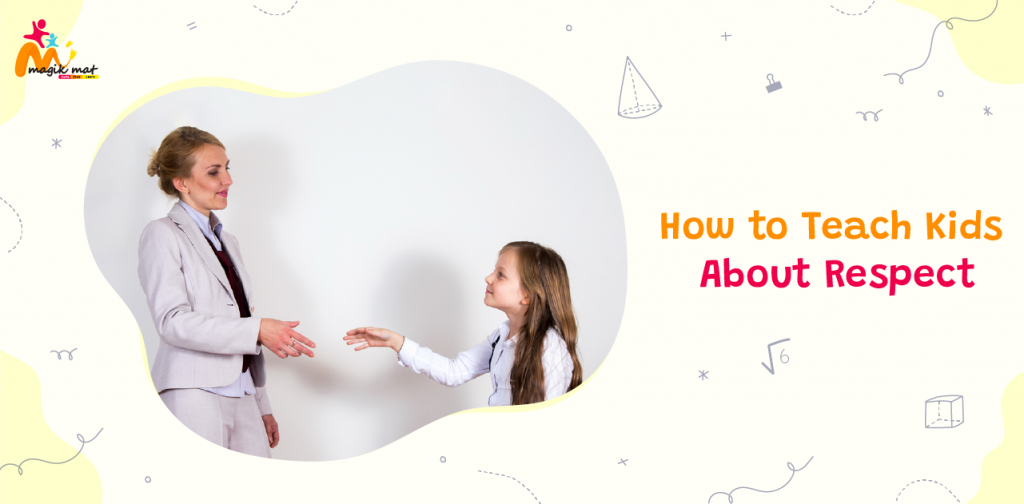Introduction:
Respect is at the root of the values we live for, and it determines how we behave towards others and our world. It should then be a virtue that kids start to develop when they are young since it is the basis for people to interact properly, communicate effectively, and create a good society. Then comes the obvious question as to what the word “Respect” actually means and how one can make children learn it. This blog delves into the concept of “Respect,” exploring its various aspects and providing practical strategies for teaching children this essential value.
What Is Respect?
Respect can be interpreted in various ways, such as showing one’s admiration, consideration, and appreciation, as well as acknowledging those qualities in others and our surroundings. It involves making people feel honored, appreciating their perspectives and spaces, and recognizing their intrinsic value. Respect necessitates a deep understanding of others, which entails observing politely, speaking kindly, and acting in ways that uphold everyone’s well-being and rights.
How to Explain Respect to Kids
We should explain respect to children in simple language that they can understand, using examples. To set the tone, we can introduce the idea that being kind to others means treating them the way they would like to be treated. For instance, sharing toys or taking turns on a playground can illustrate this concept. We should highlight the principle that everyone should treat others with consideration and fairness, regardless of differences in age, gender, race, or background.
Different Types of Respect
Respect manifests in different forms, such as self-respect, respect for others, and respect for the environment. Self-esteem involves loving yourself, setting boundaries, and making the right decisions in life. Tolerance is demonstrated through an awareness of others’ feelings, thoughts, and views, even when they are not similar to our own. One of the important aspects of environmental consciousness is respect for nature, which covers taking care of the environment, saving resources, and protecting ecosystems.
How to Teach Respect to Kids
We can teach respect for kids through diverse strategies that involve teaching, demonstrating, and rewarding. Below are the important guidelines for teaching respectful behavior to children:
1. Define Respectful Words & Behaviors:
Teach children manners like saying “Please” and “Thank You,” listening patiently, and admitting mistakes. Give real-life illustrations of these behaviors and encourage them to use them in their day-to-day interactions.
2. Be A Role Model:
Kids learn by watching the behavior of those around them. Practice good manners in your daily life, including how you communicate with your family, friends, or even strangers. Be empathetic, patient, and tolerant, and resolve conflicts and disagreements peacefully and constructively.
3. Show Them How:
Emphasize role-playing and real-life stories to demonstrate the ability to behave respectfully and solve problems. Encourage children to imagine how they would feel if they were in the position of others and consider how their actions can impact others. Acknowledge and appreciate when they show respect, and gently remind them if they struggle in social situations.
4. Explain How Respect Feels:
Enable children to understand the emotional effects of respect by engaging them in dialogue that extends beyond how it feels to be treated with kindness, fairness, and respect. Challenge them to reflect on times when they have felt respected or disrespected and encourage them to attribute those feelings to specific behaviors.
5. Encourage Critical Thinking:
Motivate kids to exercise their conscience regarding the meaning of respect when it comes to a wide range of environments. Illustrate hypothetical situations and use open-ended queries in conversations on dilemmas and principles of ethics. Train them to adopt other perspectives and think through the consequences of their actions, not only on themselves but on other people’s lives as well.
6. Promote Cultural Respect:
Teach children how to value diversity and to treat people with respect for their various cultures. Immerse them in different cultures, traditions, and points of view by providing access to a variety of books, movies, and multicultural activities. Inspire them to enjoy the wealth of human diversity by encouraging acceptance, sharing, and the development of feelings of kindness, respect, and global citizenship.
7. Foster Empathy & Compassion:
Create empathy and compassion in children by guiding them to reflect on the feelings and lives of others. Sit down and have conversations about empathy, kindness, and the importance of supporting those who are less fortunate. Allow children to develop empathic abilities through caring acts, such as volunteering, service, and community work.
8. Set Clear Expectations & Consequences:
Set out specific expectations for respectful behavior and communicate them consistently. Praise and reward your child for positive behavior, rather than just reprimanding them when they exhibit negative behavior. Establish clear consequences for disrespectful behavior, such as reducing their privileges or implementing time-outs, and apply them promptly and gently.
Conclusion
In conclusion, teaching children about respect is an integral aspect of their moral and personal development. By instilling respect and regard from a young age, we equip children with the skills to interact successfully with others, resolve conflicts peacefully, and actively engage in society. Through defining respect, explaining its various forms, and employing effective teaching techniques, we can cultivate a generation that values self-awareness, empathy, and responsibility, treating both themselves and others with care and respect. Education through demonstrating and emphasizing respectful behavior helps children recognize respect as the foundation of their lives, fostering a more just, equitable, and peaceful society for future generations.





